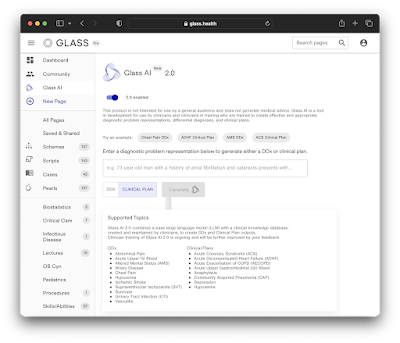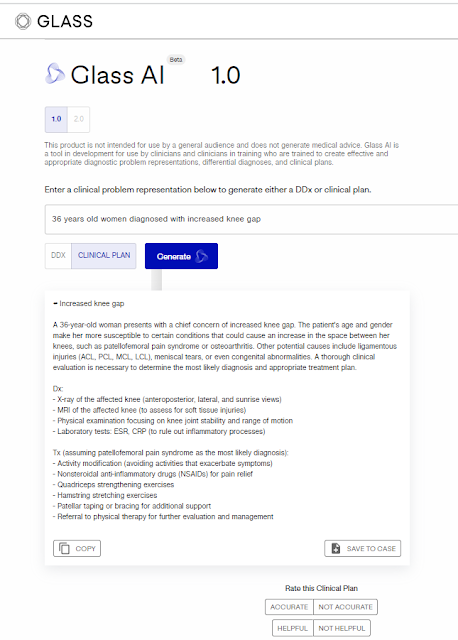Glass Health is a startup that aims to empower doctors with AI-assisted diagnosis and clinical decision-making. The company was founded in 2021 by Dereck Paul, MD, a former internal medicine resident at Harvard Medical School, and Graham Ramsey, a former product designer at PlushCare and Modern Fertility. Glass Health is backed by Y Combinator, Breyer Capital, and other investors.
Glass Health's main product is Glass AI, a platform that can generate a differential diagnosis or a clinical plan based on the user's problem representation. A problem representation is a concise summary of the patient's chief complaint, history, physical exam, and relevant test results. Glass AI uses natural language processing and deep learning to analyze the problem representation and provide relevant suggestions for diagnosis and management.
Glass AI is designed to be a digital notebook for doctors, where they can organize and curate their medical knowledge. Users can create notes for different cases, topics, or specialties, and access them anytime from any device. Users can also share their notes with other clinicians or learners, and get feedback from Glass AI or their peers.
Glass AI is not intended to replace human judgment or clinical expertise, but rather to augment it with data-driven insights and evidence-based recommendations. Glass AI can help doctors save time, reduce errors, improve outcomes, and enhance their learning experience.
Glass AI is currently available for free for anyone who wants to try it out. The platform covers a select group of high-yield medical topics, such as chest pain, dyspnea, headache, abdominal pain, and more. The company plans to expand the scope and functionality of Glass AI in the future, as well as to integrate it with other clinical software systems.
Glass AI Versions and Features
Glass AI is a reference tool and assistant that helps clinicians with differential diagnosis, evidence-based treatment, and documentation. Glass AI uses a large language model (LLM) combined with a clinical knowledge database created by a team of clinicians.
Glass AI 1.0 was the first version of Glass AI that was released to the public in January 2022. It allowed users to enter a patient's chief complaint, history of present illness, and physical exam findings, and get a list of possible diagnoses and treatment plans generated by the LLM. Glass AI 1.0 was intended to be a proof of concept and a way to gather feedback from the medical community.
Glass AI 2.0 is the latest version of Glass AI that was released in February 2022. It is an improved version of Glass AI 1.0 that incorporates clinician training and feedback. Glass AI 2.0 uses the same LLM as Glass AI 1.0, but it also leverages a clinical knowledge database that contains curated information on high-yield medical topics. The clinical knowledge database was created by the Glass AI Clinical Contributor team, which consists of physicians, medical students, and residents who have expertise in various specialties.
The main difference between Glass AI 1.0 and Glass AI 2.0 is that Glass AI 2.0 produces better differential diagnosis and clinical plan outputs than Glass AI 1.0. This is because Glass AI 2.0 can access the clinical knowledge database and use it to supplement the LLM's predictions. For example, if a user enters "chest pain" as the chief complaint, Glass AI 2.0 will not only generate a list of possible causes based on the LLM, but also rank them according to their likelihood and severity based on the clinical knowledge database. Similarly, if a user enters "pneumonia" as the diagnosis, Glass AI 2.0 will not only generate a list of possible treatments based on the LLM, but also recommend the most appropriate antibiotics and dosages based on the clinical knowledge database.
Another difference between Glass AI 1.0 and Glass AI 2.0 is that Glass AI 2.0 has a more user-friendly interface and design than Glass AI 1.0. Glass AI 2.0 allows users to easily switch between different tabs within the product, such as "Glass Notebook", "Glass AI", and "Glass Library". Glass Notebook is where users can create and organize their own notes using markdown syntax. Glass AI is where users can access the LLM and the clinical knowledge database to get assistance with their cases. Glass Library is where users can browse and search through the clinical knowledge database to learn more about various medical topics.
Glass AI 2.0 also has a more interactive and engaging way of presenting its outputs than Glass AI 1.0. For example, instead of simply showing a list of diagnoses or treatments, Glass AI 2.0 shows them in a graphical format, such as a pie chart or a bar chart, that allows users to compare and contrast them easily. Additionally, Glass AI 2.0 provides explanations and references for its outputs, such as links to relevant articles or guidelines, that allow users to verify and learn more about them.
Glass AI 1.0 and Glass AI 2.0 are two versions of a novel knowledge management system for doctors that use a combination of an LLM and a clinical knowledge database to assist clinicians with differential diagnosis, evidence-based treatment, and documentation. While both versions use the same LLM, Glass AI 2.0 is an improved version that incorporates clinician training and feedback, and uses a clinical knowledge database that contains curated information on high-yield medical topics. As a result, Glass AI 2.0 produces better outputs than Glass AI 1.0, and has a more user-friendly interface and design than Glass AI 1.0.
Glass Health is on a mission to create frictionless software for learning and practicing medicine. The company believes that AI can be a powerful tool for improving healthcare quality and accessibility around the world. To learn more about Glass Health and Glass AI, visit
https://glass.health/ai.













No comments: